| This article needs additional citations for verification. Please help improve this article by adding citations to reliable sources. Unsourced material may be challenged and removed. Find sources: "2004 Democratic National Convention" – news · newspapers · books · scholar · JSTOR (March 2007) (Learn how and when to remove this message) |
2004 presidential election | |
  Nominees NomineesKerry and Edwards | |
| Convention | |
|---|---|
| Date(s) | July 26–29, 2004 |
| City | Boston, Massachusetts |
| Venue | FleetCenter |
| Chair | Bill Richardson of New Mexico |
| Keynote speaker | Barack Obama of Illinois |
| Candidates | |
| Presidential nominee | John Kerry of Massachusetts |
| Vice-presidential nominee | John Edwards of North Carolina |
| Voting | |
| Total delegates | 4,322 |
| Votes needed for nomination | 2,164 |
| Results (president) | Kerry (MA): 4,253 (98.40%) Kucinich (OH): 43 (0.99%) Abstention: 26 (0.60%) |
| Results (vice president) | Edwards (NC): Acclamation |
| Ballots | 1 |
| ‹ 2000 · 2008 › | |
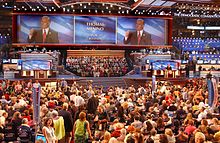
The 2004 Democratic National Convention convened from July 26 to 29, 2004 at the FleetCenter (now the TD Garden) in Boston, Massachusetts, and nominated Senator John Kerry from Massachusetts for president and Senator John Edwards from North Carolina for vice president, respectively, in the 2004 presidential election.
The 2004 Democratic National Convention was famous because it included the keynote speech of Barack Obama, who would go on to be elected President four years later. New Mexico Governor Bill Richardson served as chairman of the convention, while former presidential advisor to Bill Clinton, Lottie Shackelford, served as vice chairwoman of the convention.
The 2004 Democratic National Convention marked the formal end of the active primary election season, although all meaningful primary elections had finished months earlier. After the convention, John Kerry and John Edwards were defeated by the incumbent George W. Bush and Dick Cheney in the general election.
Convention themes
The 2004 Democratic National Convention featured a theme for each day of the convention. The first night of the meeting focused on the theme "Plan for America's Future" with speeches devoted to building optimism for John Kerry's candidacy. The second night of the meeting focused on the theme "A Lifetime of Strength and Service" devoted to John Kerry's biography and his path to his nomination. The third night of the meeting focused on the theme "A Stronger More Secure America" devoted to issues of homeland security and the global war on terror. The last night of the meeting focused on the theme "Stronger at Home, Respected in the World" devoted to the overall agenda of the party to secure the borders, improving domestic welfare while at the same time promoting international cooperation in world affairs. The phrase "Help is on the Way" was often repeated by speakers such as John Edwards.
This was the first major party presidential nominating convention to be held since the terrorist attacks of September 11 attacks. During the convention, there was a memorial service to honor the victims of the attacks. Haleema Salie, who lost her daughter, son-in-law, and unborn grandchild on American Flight 11, spoke.
Party platform
The 2004 Democratic National Convention successfully passed an official party platform. A forty-three page document, the party platform was entitled "Strong at Home, Respected in the World" – also the name of the theme conveyed on the last night of the convention. The first part of the platform was called "A Strong, Respected America". The section defined specific goals and actions to defeat terrorism, to keep weapons of mass destruction from the hands of terrorists, to promote world peace and security, to strengthen the military, to achieve energy independence and to strengthen homeland security. The second part of the platform was called, "A Strong, Growing Economy". The section defined specific goals and actions to create what the party called "good jobs" and "standing up for the great American middle class." The third part of the platform was called, "Strong, Healthy Families." The section defined specific goals and actions to reform the healthcare system in the United States, to improve education and to protect the environment. The final part of the platform was called, "A Strong American Community." It stressed the diversity of the nation and the importance of upholding civil rights as a major tenet of the party.
Site selection


| City | Status of bid | Venue | Financial package pledged by city |
Previous major party conventions hosted by city |
|---|---|---|---|---|
| Boston, Massachusetts | Winner | FleetCenter | $49.5 million | — |
| Detroit, Michigan | Finalist | Ford Field, Joe Louis Arena, Cobo Hall | $50 million | Republican: 1980 |
| Miami, Florida | Finalist | American Airlines Arena, Coconut Grove Convention Center, and Miami Beach Convention Center | $40 million | Democratic: 1972 Republican: 1968, 1972 |
| New York City, New York | Finalist | Madison Square Garden | $72 million | Democratic: 1868, 1924, 1976, 1980, 1992 |
| Baltimore, Maryland | Non-finalist | Potentially Oriole Park at Camden Yards | Democratic: 1832, 1835, 1840, 1844, 1848, 1852, 1860, 1872, 1912 Republican: 1864 Whig: 1844, 1852, 1856 |
After an initial notice to 34 cities, 10 cities requested the RFP to host the convention: Atlanta, Baltimore, Boston, Chicago, Dallas, Detroit, Houston, Miami, New York City and Pittsburgh. Of those, Baltimore, Boston, Detroit, Miami and New York City submitted bids. Baltimore's bid was considered a long-shot. The city lacked a conventional venue with enough space to accommodate the convention, and was proposing the prospect of erecting a temporary canopy at Oriole Park at Camden Yards (which would have likely necessitated the baseball team tenant to vacate the venue for a roughly two-month period of their season). Baltimore was eliminated. Boston, Detroit, Miami and New York City were selected as the finalist cities. Each of the finalist cities received visits from members of the Democratic National Committee during the site selection process. Boston was announced as the host of the convention on November 13, 2002.
The 2004 Democratic National Convention was the first major party presidential nominating convention to held in Boston. With John Kerry arising as the winner of the primaries, it ultimately was one of the few presidential nominating conventions that was held in the home state of the party's nominee.
As a result of the selection of Boston, organizers of the Reebok Pro Summer League developmental basketball program had to fold the league into the upstart Las Vegas Summer League due to a lack of lodging in the Boston area.
Until Chicago, Illinois was selected as the host of the 2024 Democratic National Convention, 2004 was the last time for either major party that they chose to hold their convention in a state that was not considered to be a swing state (the Republicans held their 2004 convention in New York City).
Logistics
Security

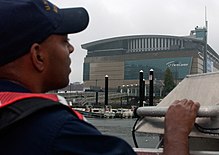
During the convention, U.S. Capitol Police, the U.S. Coast Guard, and other governmental organizations took many security measures to protect the participants of the Democratic National Convention. Security measures included bomb-sniffing dogs, 7-feet high metal barricades, a ban on corporate and private flights at Logan International Airport, along with the temporary closure of Interstate 93.
Police union
Other Bostonians took advantage of the meeting as a national stage for specific agendas. The police union, for example, gained attention with threats of picketing of delegates from entering and exiting functions – a dilemma for Democrats as the party has traditionally been an ally of organized labor. Having worked without a contract for two years, the Boston Police Patrolmen's Association struck a deal with Boston mayor Thomas Menino for a new contract, avoiding a major embarrassment for the party.
Barack Obama's keynote address
Main article: 2004 Democratic National Convention keynote addressState Senator Barack Obama, the Illinois Democratic candidate for United States Senate, delivered the convention's keynote address on Tuesday, July 27, 2004. His unexpected landslide victory in the March 2004 Illinois U.S. Senate Democratic primary had made him overnight a rising star within the national Democratic Party, started speculation about a presidential future, and led to the reissue of his memoir, Dreams from My Father. His keynote address, although not carried by the commercial broadcast television networks, was well received, which further elevated his status within the Democratic Party and led to his reissued memoir becoming a bestseller. As the keynote speaker, Obama set the tone for the party platform. His speech, proclaiming the unnecessary and artificial divides in American culture and politics, was reminiscent of John Edwards's "Two Americas" stump speech: "There's not a liberal America and a conservative America—there's the United States of America." Obama emphasized the importance of unity, and made veiled jabs at the Bush administration and the news media's perceived oversimplification and diversionary use of wedge issues: "We worship an awesome God in the blue states, and we don't like federal agents poking around in our libraries in the red states. We coach Little League in the blue states, and yes, we've got some gay friends in the red states. There are patriots who opposed the war in Iraq, and there are patriots who supported the war in Iraq. We are one people, all of us pledging allegiance to the Stars and Stripes, all of us defending the United States of America."
Obama noted his interracial and international heritage: he was born in Honolulu, Hawaii to a Kenyan immigrant father and a white mother from Kansas. He emphasized the power of education, recounting the privilege of attending the exclusive Punahou School and Harvard Law School despite his family's poverty, and criticized the perception that poor black youths who read books are "acting white." He went on to describe his successful career in law and politics while raising a family in Chicago. "In no other country on Earth is my story even possible", Obama proclaimed. Towards the end of his speech, he emphasized the importance of hope in the American saga, and he illustrated how that hope manifested itself in the lives of John Kerry, John Edwards, and even his own personal life, as "a skinny kid with a funny name who believes that America has a place for him too." According to Obama, the "audacity of hope" is "God's greatest gift" to Americans, allowing him to feel optimistic that the lives of average Americans can be improved with the right governmental policies. Following the speech political commentator Chris Matthews rightly predicted "I just saw the first black president".
Edwards' address
Main article: Two AmericasNot yet formally nominated for the vice presidency, John Edwards took the stage at the convention to give the first major national speech of his political career. Delegates raised red-and-white vertical "Edwards" banners and chanted his name. The theme of Edwards's address was the divide between the "two Americas", his populist message throughout the primary campaign and now one embraced by Kerry. He tied the division to his own roots in North Carolina, and introduced his family to the audience. Edwards addressed his parents from the podium: "You taught me the values that I carry in my heart: faith, family, responsibility, opportunity for everyone. You taught me that there's dignity and honor in a hard day's work. You taught me to always look out for our neighbors, to never look down on anybody, and treat everybody with respect." Edwards went on to define the two Americas he claimed to exist, one for the rich and one for the poor, and repeated several times that "It doesn't have to be that way." He called for one health care system, equal in quality to the coverage received by senators and other elected officials, and promised to establish a Patients' Bill of Rights. Edwards proposed one public school system for all, arguing that "None of us believe that the quality of a child's education should be controlled by where they live or the affluence of their community." He appealed for the end of the two economies, "one for people who are set for life, they know their kids and grandkids are going to be just fine, and then one for most Americans, people who live paycheck to paycheck." Edwards also stated how the Democrats expected to pay for their agenda: "We're going to roll back – we're going to roll back the tax cuts for the wealthiest Americans. And we're going to close corporate loopholes. We're going to cut government contractors and wasteful spending. We can move this country forward without passing the burden to our children and our grandchildren."
Many pundits noted that while Edwards's charismatic style was in evidence, he had rushed through the speech, ending several minutes earlier than planned. The delegates in the FleetCenter, however, were enraptured, and Edwards led them several times in a statement-response chant: "Hope is on the way." This, and the general upbeat tone of the address, was a response to attacks by the Bush campaign claiming that Kerry and Edwards were pessimistic and cynical; it was altered and echoed the next day in the more detailed speech of John Kerry: "Help is on the way."
Results of delegate voting
In the days before the convention started, the other candidates withdrew, freed their delegates and officially endorsed Kerry. All the delegates voted to ratify this decision and vote for Kerry, except those of Kucinich, who attempted to vote for Kucinich anyway. Many states refused to let them do so, and only permitted them to register abstentions. The final tally went thus:
President
| Democratic National Convention presidential vote, 2004 | ||
|---|---|---|
| Candidate | Votes | Percentage |
| John Kerry | 4,253 | 98.40% |
| Dennis Kucinich | 43 | 0.99% |
| Abstentions | 26 | 0.60% |
| Totals | 4,322 | 100.00% |
Vice president
- John Edwards was chosen by acclamation.
Kerry's address
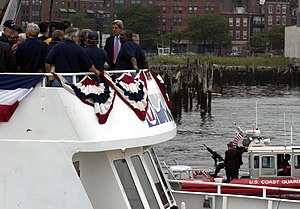
Prior to his speech, John Kerry's daughter spoke about her father. After this, a video played, showing highlights from Kerry's life, including his birth in Colorado, his childhood in New England, the travels with his diplomat father to post-World War II Germany, and his service in Vietnam's Mekong Delta, interspersed with clips of Kerry speaking and narrated voice overs. After the video's conclusion, former U.S. Senator Max Cleland delivered a speech proclaiming that the global conflict and active wars in Afghanistan and Iraq required a decorated military hero such as Kerry in the White House. This concluded with Kerry's entrance, where he made a military salute and announced, "I'm John Kerry, and I'm reporting for duty!" Kerry then accepted the nomination for president.
Democrats reacted positively to John Kerry's acceptance speech. With Democrats strongly opposed to the Bush administration, John Kerry spent most of his speech appealing to independent voters and to swing voters. He promised to train 40,000 new active duty troops, to implement all the recommendations of the 9/11 Commission, to cut the national deficit in half within four years, to cut middle class taxes while repealing the Bush administration's tax cuts for those making more than US$200,000 per year, to stop privatization of Social Security, and to expand stem cell research.
On the day after Kerry's speech, George W. Bush's reelection campaign launched a counterattack on the claims and promises made by Kerry and others at the convention. At a campaign stop in Springfield, Missouri, Bush told a crowd: "My opponent has good intentions, but intentions do not always translate to results", attacking Senator Kerry's record in the Senate.
Other speakers
Main article: 2004 Democratic National Convention SpeakersIn addition to the Obama, Edwards, and Kerry addresses, there were also speeches from former presidents Bill Clinton and Jimmy Carter, former vice-president and 2000 presidential nominee Al Gore, New York Senator and former First Lady Hillary Clinton, Massachusetts senator Ted Kennedy, former candidate Al Sharpton, and presidential advisory counsel on HIV/AIDS Denise Stokes. Ron Reagan, son of Republican president Ronald Reagan, also spoke at the convention, blaming Bush's hijacking of his father's legacy for his switch in support to the Democrats.
Lack of convention 'bounce'
Polls conducted after Kerry's speech showed no significant increase of support (or "convention bounce") for the Democratic nominee's bid to unseat President Bush. Democrats ascribed the disappointing numbers to an unusually polarized electorate that year with few undecided voters, though Bush did get a small bounce out of his convention.
Demonstrations and protests
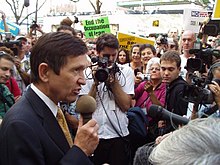

There were a number of demonstrations during the 2004 Democratic National Convention. Protesters included members of the Bl(A)ck Tea Society, a group of self-described anarchists, who opposed the war in Iraq. Approximately 400 members of the Bl(A)ck Tea Society marched through Boston's financial district and headed toward the FleetCenter, where they set fire to an effigy that showed George Bush on one side and John Kerry on the other.
That evening a group of peace activists held a peaceful rally a few hundred feet from the FleetCenter. Local Boston politicians were joined by presidential candidate Dennis Kucinich and long-time activist and California state senator Tom Hayden in a call to end the occupation of and to remove U.S. troops from Iraq and to bring in an international peacekeeping force. Also, Hayden and Kucinich called on anti-war Democrats to support John Kerry against George Bush in the general election.
The largest protest was held on the Sunday evening before the convention was set to start. An estimated 2,000 anti-war members marched at the same time as approximately 1,000 anti-abortion activists, and the two groups crossed paths en route to the convention center. The following day, this anti-abortion group had its permit revoked to protest outside of the Kerry family home. They challenged the decision, but it was upheld by a federal judge, who sided with the Secret Service in determining that the protest would be too close to Kerry's home, potentially endangering the presidential candidate.
See also
- 2004 Green National Convention
- 2004 Libertarian National Convention
- 2004 Republican National Convention
- 2004 Democratic Party presidential primaries
- 2004 United States presidential election
- John Kerry 2004 presidential campaign
- List of Democratic National Conventions
- United States presidential nominating convention
- History of the United States Democratic Party
References
- "2004 Democratic Convention Speakers List". Archived from the original on November 14, 2007. Retrieved May 15, 2007.
- "Transcript of Edwards' speech". Archived from the original on September 27, 2007. Retrieved May 15, 2007.
- "Elections 2004 - Rounding Up The Democratic Convention". Moderateindependent.com. July 30, 2004. Archived from the original on September 27, 2007. Retrieved September 4, 2013.
- ^ Webb, Cynthia L. (July 26, 2004). "Democrats Get Wired in Boston". The Washington Post. Archived from the original on April 28, 2011. Retrieved May 15, 2007.
- Shales, Tom (July 28, 2004). "Bill Clinton, Getting the Gang Ready to Rock and Roll". The Washington Post. Retrieved October 5, 2021.
- ^ Collins, Dan (November 19, 2002). "Dems Pick Boston For 2004 Convention". CBS News.
- "Conventions-2004 Site Selection". p2004.org. Retrieved February 24, 2022.
- ^ Johnson, Glen (April 25, 2002). "Hub, 4 rivals buff their Democratic party ware". Newspapers.com. The Boston Globe. Retrieved February 24, 2022.
- "Miami makes pitch to host party convention". Newspapers.com. Florida Today. Associated Press. July 17, 2002. Retrieved February 24, 2022.
- "Conventions-2004 Site Selection". p2004.org. Retrieved February 24, 2022.
- ^ "Site Selection 2004". GWU. Retrieved January 13, 2009.
- Christovich, Amanda (July 19, 2018). "How NBA's inaugural Vegas Summer League was kick-started by the Democratic National Convention". USA Today. Retrieved February 15, 2019.
- Petre, Linda (January 11, 2022). "Search for 2024 convention sites ramps up in both parties". The Hill. Retrieved February 23, 2022.
- "Dems select Chicago for 2024 convention". PBS NewsHour. April 11, 2023. Retrieved April 15, 2023.
- ^ "Security details: dogs, guns, choppers – politics". NBC News. July 25, 2004. Retrieved September 4, 2013.
- ^ Greenhouse, Steven (June 30, 2004). "Democrats Fear Boston Police Union May Picket During Party Convention". The New York Times. ISSN 0362-4331. Retrieved May 5, 2018.
- Mendell, David (March 17, 2004). "Obama routs Democratic foes; Ryan tops crowded GOP field; Hynes, Hull fall far short across state". Chicago Tribune. p. 1. Retrieved September 13, 2012.
- Davey, Monica (March 18, 2004). "As quickly as overnight, a Democratic star is born". The New York Times. p. A20. Archived from the original on April 12, 2019. Retrieved September 13, 2012.
- Howlett, Debbie (March 19, 2004). "Dems see a rising star in Illinois Senate candidate". USA Today. p. A04. Archived from the original on March 19, 2009. Retrieved September 13, 2012.
- Scheiber, Noam (May 31, 2004). "Race against history. Barack Obama's miraculous campaign". The New Republic. pp. 21–22, 24–26 (cover story). Archived from the original on May 13, 2010. Retrieved September 13, 2012.
- Finnegan, William (May 31, 2004). "The Candidate. How far can Barack Obama go?". The New Yorker. pp. 32–38. Retrieved September 13, 2012.
- Dionne Jr., E.J. (June 25, 2004). "In Illinois, a star prepares". The Washington Post. p. A29. Archived from the original on July 26, 2008. Retrieved September 13, 2012.
- Scott, Janny (May 18, 2008). "The story of Obama, written by Obama". The New York Times. p. A1. Archived from the original on April 12, 2019. Retrieved September 13, 2012.
- Mendell, David (August 14, 2007). Obama: from promise to power. Amistad/HarperCollins. pp. 235–259. ISBN 978-0-06-085820-9.
- "Star power. Showtime: Some are on the rise; others have long been fixtures in the firmament. A galaxy of bright Democratic lights". Newsweek. August 2, 2004. pp. 48–51. Archived from the original on October 10, 2013. Retrieved September 13, 2012.
- Samuel, Terence (August 2, 2004). "A shining star named Obama. How a most unlikely politician became a darling of the Democrats". U.S. News & World Report. p. 25. Archived from the original on December 6, 2008. Retrieved September 13, 2012.
- Lizza, Ryan (September 2004). "The Natural. Why is Barack Obama generating more excitement among Democrats than John Kerry?". The Atlantic Monthly. pp. 30, 33. Archived from the original on May 15, 2008. Retrieved September 13, 2012.
- Davey, Monica (July 26, 2004). "A surprise Senate contender reaches his biggest stage yet". The New York Times. p. A1. Archived from the original on May 11, 2011. Retrieved September 13, 2012.
- Leibovich, Mark (July 27, 2004). "The other man of the hour". The Washington Post. p. C1. Archived from the original on May 16, 2008. Retrieved September 13, 2012.
- Milligan, Susan (July 27, 2004). "In Obama, Democrats see their future". The Boston Globe. p. B8. Archived from the original on December 18, 2008. Retrieved September 13, 2012.
- Seelye, Katharine Q. (July 28, 2004). "Illinois Senate nominee speaks of encompassing unity". The New York Times. p. A1. Archived from the original on June 24, 2006. Retrieved September 13, 2012.
- Broder, David S. (July 28, 2004). "Democrats focus on healing divisions; Addressing convention, newcomers set themes". The Washington Post. p. A1. Archived from the original on July 26, 2008. Retrieved September 13, 2012.
- Bing, Jonathan; McClintock, Pamela (July 29, 2004). "Auds resist charms of Dem stars; Convention sees tepid ratings". Variety. p. 1. Retrieved September 13, 2012.
- Mendell, David (August 14, 2007). Obama: from promise to power. Amistad/HarperCollins. pp. 272–285. ISBN 978-0-06-085820-9.
- "Barack Obama 2004 Democratic National Convention Keynote Address". American Rhetoric. Retrieved July 7, 2021.
- "Complete Obama Speech Archive: Keynote Address at 2004 Democratic National Convention". Archived from the original on May 19, 2010. Retrieved February 12, 2009.
- ^ "Text:Sen. John Edwards Speech to DNC". The Washington Post. July 28, 2004. Retrieved October 20, 2007.
- "Democratic Convention 2004". The Green Papers. Retrieved April 13, 2008.
- ^ Wilgoren, Jodi; Halbfinger, David (July 31, 2004). "THE 2004 CAMPAIGN: REACTION; Democrats Across the Board Are Pleased". The New York Times. Retrieved January 18, 2010.
- ^ "'We Have It in Our Power to Change the World Again'". The New York Times. July 29, 2004.
- "President's Remarks in Springfield, Missouri Remarks". Retrieved January 15, 2010.
- "No Convention Bounce For Kerry". CBS News. February 11, 2009. Retrieved September 4, 2013.
- Page, Susan (August 3, 2004). "So why did Bush, not Kerry, get the bounce?". Usatoday.Com. Retrieved September 4, 2013.
- ^ "Boston protests draw police action – politics". NBC News. July 29, 2004. Retrieved September 4, 2013.
- "The Constituencies: Liberals; From Chicago '68 to Boston, The Left Comes Full Circle". The New York Times. July 28, 2004. Retrieved September 4, 2013.
- "Anti-abortion groups lose suit over protests – politics". NBC News. July 26, 2004. Retrieved September 4, 2013.
External links
- Unofficial Convention Website (archived)
- Democratic Party Platform of 2004 at The American Presidency Project
- Kerry Nomination Acceptance Speech for President at DNC (transcript) at The American Presidency Project
- Official FleetCenter website
- Complete text, audio, video of Barack Obama's DNC Address AmericanRhetoric.com
- Video of Kerry nomination acceptance speech for President at DNC (via YouTube)
- Audio of Kerry nomination acceptance speech for President at DNC
- Video of Edwards nomination acceptance speech for Vice President at DNC (via YouTube)
- Audio of Edwards nomination acceptance speech for Vice President at DNC
- Transcript of Edwards nomination acceptance speech for Vice President at DNC
| Preceded by 2000 Los Angeles |
Democratic National Conventions | Succeeded by 2008 Denver |
| Democratic Party | |||||||
|---|---|---|---|---|---|---|---|
| National conventions, presidential tickets, and presidential primaries |
| ||||||
| Presidential administrations |
| ||||||
| U.S. House leaders, Speakers, and Caucus chairs |
| ||||||
| U.S. Senate leaders and Caucus chairs |
| ||||||
| Chairs of the DNC |
| ||||||
| State and territorial parties |
| ||||||
| Affiliated groups |
| ||||||
| Related |
| ||||||
| John Kerry | |||||
|---|---|---|---|---|---|
| |||||
| Career |   | ||||
| Elections |
| ||||
| Related | |||||
| Family |
| ||||
| John Edwards | |||||||
|---|---|---|---|---|---|---|---|
| Family |
| 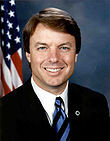 | |||||
| Other associates |
| ||||||
| Political elections |
| ||||||
| Political themes and issues | |||||||
| Books authored | |||||||